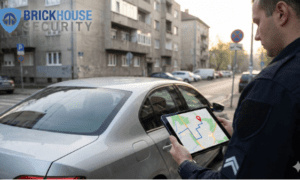Discover how to develop a GPS tracking app for vehicles and fleets, featuring real-time location monitoring, route optimization, and fleet management solutions.
In this era of technology, in which logistics and transportation play a key role in commercial enterprise operations, the demand for efficient fleet control has multiplied. GPS tracking apps have emerged as powerful tools for companies trying to manage their operations, enhance security and optimise resource utilisation. Whether you’re handling a small fleet of cars or a massive logistics community, making an investment in sturdy GPS tracking app development can boost productivity and protection across your operations
Understanding GPS Tracking App Development
GPS (Global Positioning System) tracking technology is the spine of modern fleet control systems. These apps use satellite navigation to find the exact location of vehicles in real time, providing huge amounts of data that can be used to make informed decisions. From monitoring vehicle actions to reading driver behaviour and optimising routes, GPS tracking apps offer comprehensive insights that empower agencies to function more successfully.
Key Features of GPS Tracking Apps
Real-time Tracking: GPS tracking apps provide live location updates, permitting fleet managers to monitor vehicle movements and routes continuously. This feature is helpful for ensuring timely deliveries, optimising dispatches, and responding swiftly to emergencies.
- Geofencing: Geofencing permits corporations to define digital obstacles on a map. Fleet managers receive indicators while automobiles enter or exit those predefined zones, enhancing safety and allowing proactive management of operational barriers.
- Route Optimization: By reading old and real-time statistics, GPS monitoring apps advise ideal routes based on elements like site traffic conditions, street closures, and weather forecasts. This feature minimises journey time, reduces gas consumption, and enhances universal performance.
- Driver Behaviour Monitoring: GPS monitoring apps reveal driving behaviour metrics, which include speed, acceleration, and braking patterns. This information allows us to pick out risky riding practices, promote adherence to organisation policies, and enhance normal driving force performance.
- Maintenance Alerts: Automated protection signals notify fleet managers about scheduled provider durations, vehicle inspections, and restoration necessities. Proactive maintenance ensures fleet reliability, reduces downtime, and extends vehicle lifespan.
Benefits of GPS Tracking App Development
Implementing a custom designed GPS tracking app development solutions gives numerous compelling benefits for organisations running fleets:
- Enhanced Operational Efficiency: Real-time monitoring and route optimization functions streamline logistics operations, leading to faster deliveries, advanced useful resource allocation, and reduced operational prices.
- Improved Fleet Safety: Monitoring driving force behaviour and imposing protection protocols through GPS tracking apps minimise risks associated with dashing, unauthorised car use, and injuries, promoting safer work surroundings.
- Asset Protection: GPS tracking apps deter robbery and unauthorised vehicle use by offering instant alerts and real-time vicinity updates. In cases of theft, the app aids in rapidly recovering stolen property.
- Data-driven Decision Making: Comprehensive analytics and reporting capabilities empower fleet managers to make facts-pushed selections. Insights into car performance, operational developments, and fuel intake optimise fleet management techniques.
- Customer Satisfaction: Timely and correct deliveries, facilitated with the aid of GPS tracking apps, enhance customer pride and loyalty. Businesses can provide customers with actual-time updates on transport fame, improving transparency and reliability.
GPS Tracking App Development Process
Developing a sturdy GPS tracking app tailor-made in your commercial enterprise requirements involves numerous key steps:
- Requirement Analysis: Collaborate with a GPS tracking app development company to outline your enterprise objectives, feature necessities, and scalability needs.
- Design and Prototyping: Create intuitive person interfaces (UI) and efficient person reviews (UX) through wireframing and prototyping. Design elements need to prioritise usability and accessibility for both fleet managers and drivers.
- Development and Integration: Utilise agile development methodologies to build the app’s backend infrastructure, frontend interfaces, and integrate GPS tracking APIs. Ensure seamless compatibility with present fleet management structures and third-birthday celebration packages.
- Testing and Quality Assurance: Conduct rigorous testing levels, along with purposeful testing, performance testing, security testing, and value testing. Address any bugs or problems directly to assure app reliability and balance.
- Deployment and Maintenance: Deploy the GPS tracking app across your fleet, offer comprehensive education to customers, and screen app performance post-launch. Implement everyday updates and maintenance to decorate app capability and address evolving business needs.
Choosing the Right GPS Tracking App Development Company
When selecting a GPS tracking app development company, don’t forget the subsequent elements:
Expertise and Experience: Evaluate the company’s tune record in building GPS tracking app development solutions for motors and fleets. Look for enterprise-unique understanding and successful case studies.
Technology Stack: Ensure the agency makes use of current technology and frameworks suitable for GPS tracking app improvement, together with GPS APIs, real-time databases, and cloud infrastructure.
Customization Capabilities: Seek an improvement partner able to customising functions, scalability alternatives, and integrating industry-particular functionalities tailor-made to your enterprise requirements.
Compliance and Security: Prioritise agencies adhering to statistics privateness regulations (like GDPR) and imposing sturdy safety features to shield touchy fleet and patron records.
Developing a GPS tracking app can vary significantly in cost based on several factors. Here’s an overview of the average cost and the influencing factors:
Average Cost of GPS Tracking App Development
The cost of GPS tracking app development typically ranges from $20,000 to $100,000 or more, depending on the complexity and scope of the project. Here’s a breakdown of factors that influence the cost:
-
App Features and Functionality:
- Basic Features: Such as real-time tracking, location history, and alerts.
- Advanced Features: Like geofencing, route optimization, analytics dashboards, and integration with IoT devices.
-
Platform (iOS, Android, Web):
- Developing for multiple platforms increases costs due to separate coding and testing requirements for each platform.
-
UI/UX Design:
- Design complexity, user interface elements, and user experience enhancements affect development time and cost.
-
Backend Development:
- Setting up servers, databases, APIs for data processing, and integration with third-party services (like maps and geolocation services).
-
Security Features:
- Implementing robust security measures (encryption, authentication) to protect user data and app integrity.
-
Integration with Hardware:
- If the app requires integration with GPS hardware devices or IoT sensors, additional development and testing are needed.
-
Regulatory Compliance:
- Ensuring compliance with data protection regulations (like GDPR) and industry standards adds complexity and cost.
-
Testing and Quality Assurance:
- Rigorous testing for functionality, performance, security, and compatibility across devices and platforms.
-
Maintenance and Support:
- Ongoing updates, bug fixes, and customer support post-launch contribute to the overall cost.
Example Cost Breakdown
- Basic GPS Tracking App: $20,000 – $40,000
- Includes essential features like real-time tracking, basic reporting, and simple user interface.
- Mid-range GPS Tracking App: $40,000 – $80,000
- Adds features such as geofencing, advanced analytics, integration with third-party APIs, and improved UI/UX design.
- Enterprise-level GPS Tracking App: $80,000 – $100,000+
- Incorporates complex features like route optimization, IoT device integration, custom reporting dashboards, and high-level security measures.
Wrapping Up
In end, leveraging GPS tracking app improvement for automobiles and fleet control is pivotal for enhancing operational performance, making sure fleet protection, and handing over advanced consumer stories. By partnering with a reputable GPS tracking app development corporation, organizations can harness the energy of actual-time information insights, optimize logistical techniques, and stay in advance in cutting-edge aggressive panorama. Embrace innovation, empower your fleet managers, and transform your logistics operations with a tailored GPS tracking app answer.



































